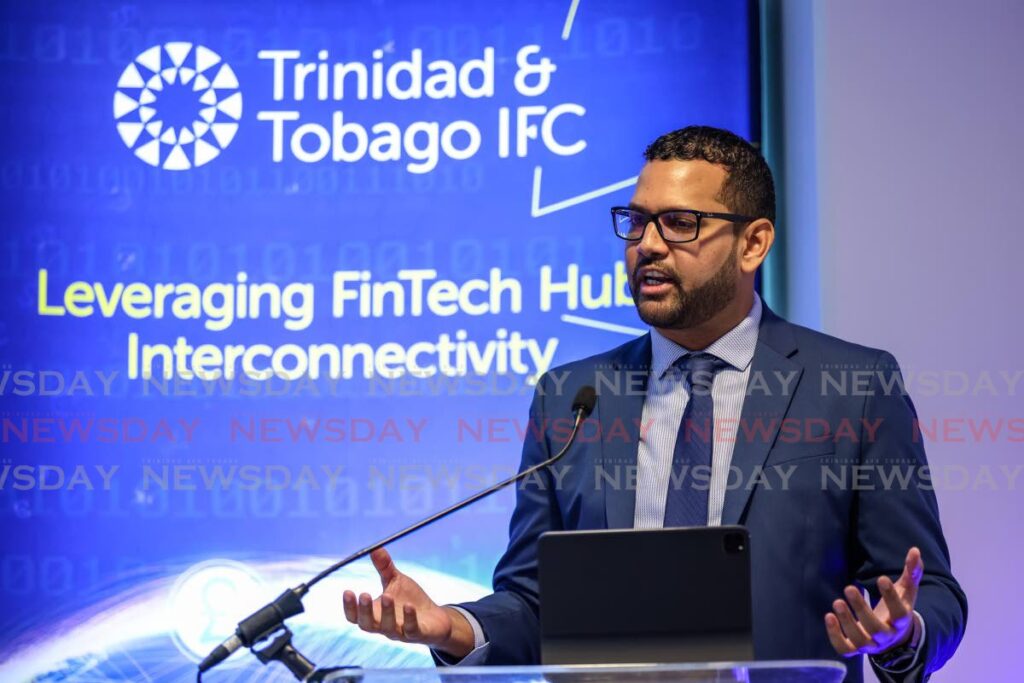Financial centre takes Trinidad and Tobago one step closer to a cashless society

The TT Financial Centre (TTIFC) is taking the country one step closer to a cashless society with the launch of its innovation centre One FinTech Avenue.
This will serve as a place for collaboration and knowledge sharing among industry experts, entrepreneurs and policy makers.
John Outridge, TTIFC’s CEO said the name is meant to immediately draw people’s mind to TT once they hear “avenue.”
Speaking at the launch at Tower D of the International Waterfront Centre, he added that July 5 should be considered as another holiday – the day Port of Spain became the “capital of innovation.”
“It is really meant to be our dedicated national fintech platform because we do believe that we have the talent. TT has the strongest foundation, I would say, in the Caribbean in terms of being able to do this,” he said
He claimed that no one else has the title of being the first to create an innovation centre like this, in the Caribbean, and so he took it upon himself to give One FinTech Avenue that stature. But the first place title was echoed by Brian Manning, minister in the Ministry of Finance during his address.
Outridge said the centre showcased cashless society and fintech solutions that have been curated for the public sector. He added that all of these platforms and creations are 100 per cent local, but there are 12 fintech solutions companies worldwide – majority are local – who applied to compete for funding.
For this collaborative environment for fintechs, an acceleration programme will be developed, with an on site ecosystem.
Also participating in the competition are Eastern Caribbean’s commercial bank representatives since one of the avenues TT is exploring is helping these islands with their own Central Bank digital currency platforms.

“This is why we have private sector partners to sort of help us work with young entrepreneurs – provide them with the infrastructure and tools and a solutions and research programme.”
Outridge said the research programme will be used to get the data and evidence of why people use cash through conducting relevant surveys, questionnaires and other related research activities to establish a source of evidence, insights, measurement and evaluation to strengthen the activities of the centre as well as generally advance digital finance and financial inclusion.
“As we speak the TTIFC in collaboration with the UN Capital Development Fund is undertaking a national financial inclusion study which is at an advanced stage.”
Outside of making TT a cashless society, Outridge said there may be strides in running a start-up for digital nomads – this is where people from different countries go to another to work remotely.
He also added that an International Monetary Fund report published in March on the Caribbean and Latin America said FinTech funding increased from US$77 million in December 2019 to US$257 million last January.
TTIFC’s chairman Richard Young said this centre took two years and months of discussion to actualise. It will foster an environment conducive to innovation and can pave the way for technologies that can transform transactions are conducted and finances are managed.
“It will provide individuals and businesses with access to cutting-edge solutions that aim to bridge the gap between traditional financial services and underserved communities. At the centre of its focus, this FinTech innovation centre will increase financial inclusion for everyone, regardless of their background or location, and ensure equal opportunities when it comes to accessing financial services,” said Young.
Manning added that over the last three years, TT’s financial sector has undertaken tremendous strides in upgrading the market payments infrastructure, which provides the foundation for FinTech to build and scale their businesses. One of which was the move from local Linx magnetic stripe cards across all local commercial banks to Visa’s contact-less credentials.
“As the largest merchant and consumer of electronic payments, the government has also contributed significantly to sparking the industry and fostering interest in digital payment technologies. One of the government’s top priorities is digital transformation and through the ministry of finance, receivers of revenue are being urged to speed up their digitalisation of payment efforts and adoption of digital financial products to improve service delivery.”
Some examples he shared were the HDC’s omni-channel payment platform for residents to make payments via cash agents, online debit and credit cards; the Judiciary’s expansion of its Court Pay platform into the NLCB’s network of over 1,700 cash agents and the Ministry of Trade’s single electronic window (Sew), which will be deployed in the coming weeks.
“The government has also prioritised regulations that support the local FinTech sector. The electronic money issuer or (EMI) order gives non-financial institutions a path towards issuing payment credentials, which has pushed local talent, capital, businesses, and FinTech to focus on developing electronic payment solutions. This creates a strong foundation to accelerate innovation and financial/digital inclusion in the coming years. At present the central bank has issued three of these licenses to local players and we anticipate more in the future,” said Manning.
Peter Cavendish, ambassador of the European Union Delegation of TT talked about the security aspects and said, “This country has succeeded due to the talents of it in working with us on a counter-terrorism technology project – a project that is ongoing with another UN body, UN office for counter-terrorism – and we’re hoping that this country can also be a leader in counter-terrorism technologies.”
He said this will complement the digitalisation stride.
Also in attendance were Housing and Urban Development Minister Camille Robinson-Regis, Communications Minister Symon de Nobriga, Keino Cox, assistant general manager emerging services and innovation of TSTT and Dr Alvin Hilaire, governor of the Central Bank.

Comments
"Financial centre takes Trinidad and Tobago one step closer to a cashless society"